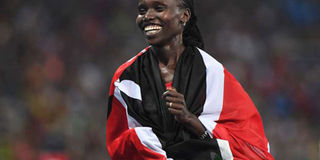Why universities should promote sports

Long-distance runner Vivian Cheruiyot at the Olympic Stadium in Rio de Janeiro during the 2016 Summer Olympics on August 19, 2016. PHOTO | OLIVIER MORIN | AFP
What you need to know:
- Kenyatta University will be the athletes' village for the IAAF World U18 Championships in July.
- This opportunity provides a challenge to other universities to pursue, promote and supports sports as important entity of their curriculum by providing scholarships and facilities that will empower the country to produce the next generation of great athletes and sports leaders.
In October last year, something very exciting took place at Kenyatta University. The institution was recognised as the number one sports university in the region and proudly took its place among the leading institutions that have promoted and supported students in sports besides other academic pursuits.
The recognition was significant because rarely does an institution receive accolades for promoting what would be perceived as non-academic pursuits. The significance is not lost when we see the proliferation of universities that lay emphasis on mainstream degrees including arts, medicine and Engineering.
Yet as a nation, our exploits in sports remain unmatched in Africa and indeed the world over. Kenya’s name has become synonymous with long-distance runners since Naftali Temu, Kipchoge Keino, and Amos Biwott, who won the country’s first gold medals at the 1968 Mexico Olympics, and Wilson Kiprugut, who won Kenya’s first ever Olympic medal, a bronze, at the 1964 Tokyo Olympics and opened the floodgates.
We have travelled a long way in sports, and so has Kenyatta University. From a reputation as the factory of future teachers, we have morphed to offering other degree courses and given this nation luminaries in theatre, medicine and sports. The diversification has been a win-win for the country. We boast of a full sports academy with such luminaries as Olympian Prof Mike Boit.
IMPORTANT COG
And that recognition has come not just from our government but the public as well. We have been charged with the responsibility to keep churning out new talent and safeguard sports as an important cog in the wheel for any maturing student.
In July this year, we will play host to one of the biggest youth athletics championships events in the world, as the hosts of the last IAAF World U18 Championships that will be held at Safaricom Stadium Kasarani. KU is the designated games village. That responsibility by the government is testimony to the long road we have travelled as an institution that promotes sports.
Our performance in the regional university sports, where we have swept the board in the last four years, speaks volumes. But beyond the self-adulation comes lessons for other universities in the region to take the challenge. That we believe that any student pursuing higher education needs to be a holistic scholar. That academic pursuits are not just confined to the lecture halls but to the track and field, football and hockey fields, indoor games and the hostels, where students relax in their free time.
NEXT GENERATION
By building on this model and providing our students with the tools to succeed beyond the classroom, we believe we are building the next generation of winners on and off the field. It is an important lesson for other universities to consider and partner with us in providing the best environment and facilities to enable our scholars to succeed beyond the lecture halls.
The CPS International that awarded our university the number one position as the leading sports university cited various reasons. The release followed a study conducted between April and July 2016 amongst Kenyan universities both public and private. The variables that were used in the ranking included scholarship awards, human resource capacity, state and number of available facilities, performance by university teams and capacity to host major sport events, amongst others.
As we welcome more than 2,500 athletes and officials to the IAAF World U18 Championships, the opportunity provides a challenge to other universities to pursue, promote and supports sports as important entity of their curriculum by providing scholarships and facilities that will empower the country to produce the next generation of great athletes and sports leaders.
Prof Paul Wainaina is the acting vice chancellor of Kenyatta University.





